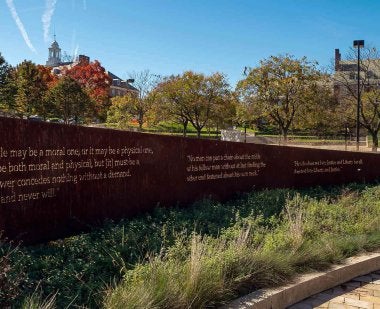
The University of Maryland this fall will launch one of the first academic minors in the country focused on identifying the causes and effects of anti-Black racism to create lasting societal change.
The College of Education is one of five colleges hosting the five-course anti-Black racism minor, including the College of Behavioral and Social Sciences, the College of Arts and Humanities, School of Public Health and School of Public Policy. The minor will be housed in the College of Behavioral and Social Sciences’ Department of African American Studies.
“I’m so excited about this new minor and the role the College of Education will play in helping to confront systemic racism that has long persisted in this country,” said Kimberly Griffin, dean, College of Education, and one of seven team members collaborating on the Anti-Black Racism Initiative, which received one of the university’s new Grand Challenges Grants. “Providing students with opportunities to understand the Black experience and building the knowledge and skill sets necessary to combat anti-Black racism are critical to moving our society forward around issues of race, equity and inclusion.”
The new minor will expose students to scholarly research from different disciplines, help them develop new ways of processing and interpreting information, and set them apart in the job market with a credential that Rashawn Ray, a professor of sociology and co-creator of the minor, said employers should value in a diversifying nation increasingly attuned to value of a variety of perspectives.
"The creation of an anti-Black racism minor is in response to our students who have advocated for ways to educate our community to foster a more inclusive environment,” said university President Darryll J. Pines.
The Anti-Black Racism Initiative strengthens UMD’s commitment to stand against anti-Black racism. The initiative will also include workshops for faculty, staff, students and community members and research that will be presented through an annual symposia and networking event.
The new program debuts amid a renewed scrutiny of the role of race in the deep inequities that plague American life—from discriminatory policing that has resulted in high-profile killings of unarmed Black Americans to environmental injustices that put disadvantaged communities of color in harm’s way from industrial and agricultural pollution.
This fall, undergraduates can enroll in “Introduction to Anti-Black Racism,” which will define anti-Black racism, describe different ways in which it may manifest, and examine how it specifically appears in different facets of American life by having faculty from each collaborating college lead the class for approximately two weeks. Undergraduates pursuing the minor must take one disciplinary course of their choosing, plus two three-credit elective courses in alignment with their career pursuits. They must also complete a capstone course and research project, directed by Department of African American Studies Lecturer and Director of Undergraduate Studies Ashley Newby.
“We want to help folks gain an awareness of anti-Black racism and be able to enter into their respective fields and recognize when concerning things are being said, when concerning actions are being done, and when concerning policies and practices are put into place,” said Jeanette Snider, an assistant research professor of social justice and anti-Black racism and principal investigator of the Anti-Black Racism Initiative. “We want to help them not just to accept these things as they are but be able to have an orientation to disrupt anti-Black racism and, of course, eradicate it at some point in our lives.”
Rhiley Jones, a sophomore government and politics major, is considering enrolling in the minor, which she called “progressive and really cool.”
“I think increasingly all across the world, people of all races are starting to fully understand the extent of racism and prejudice and discrimination that African American people are facing,” she said. “Students are realizing that conducting research on racism and using data to implement techniques to help African Americans and other minorities achieve their fullest potential, are useful skills for all majors, as there's a lot of intersectionality to it.”



